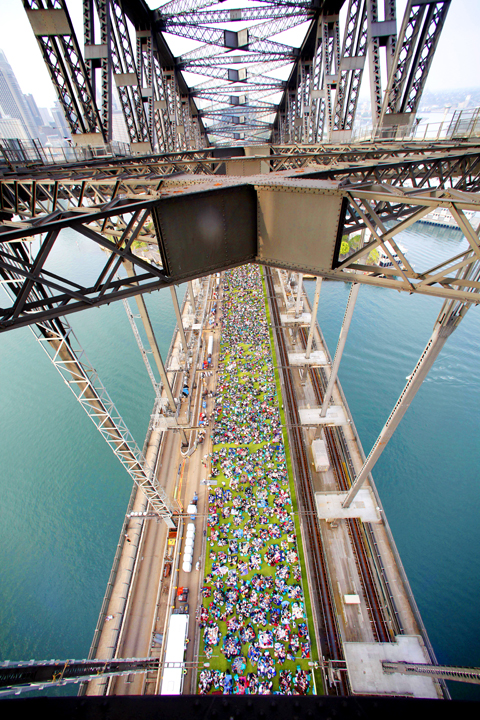Thousands sat down to breakfast on the Sydney Harbour Bridge yesterday after the iconic structure was closed to traffic and carpeted with grass for the first time for a giant picnic.
About 6,000 early risers were on the steel bridge from 6:30am to take part in the two-hour event designed to showcase Sydney’s best food and outdoor lifestyle.
While accordion players and trumpeters provided background music, those who had won tickets to the picnic in a random lottery munched on fruit, pastries, muesli, yoghurt and the staple Australian breakfast spread, Vegemite.

PHOTO: AFP
“It’s amazing to see the bridge in this perspective,” Sydneysider Don Fuchs said of the structure, which is used by about 100,000 cars daily. “Usually you sit in the car, you cross it and that’s it.”
“It was beautiful,” said Linda Curnow who attended the picnic with her family. “The grass was so thick it was like being in your backyard.”
New South Wales state Premier Nathan Rees said the event was set to become an annual feature of Sydney’s month-long October food festival.
About 45,000 people applied for tickets to the breakfast, for which people brought their own food but were able to taste samples from some of the state’s best producers.
“I don’t think we were ever doubtful of the success of this event today,” a government spokesman said. “It was a unique world first for this iconic attraction. This type of event typifies the Australian personality.”
Organizers are planning to use about 40 percent of the grass on Sydney parks.

Eleven people, including a former minister, were arrested in Serbia on Friday over a train station disaster in which 16 people died. The concrete canopy of the newly renovated station in the northern city of Novi Sad collapsed on Nov. 1, 2024 in a disaster widely blamed on corruption and poor oversight. It sparked a wave of student-led protests and led to the resignation of then-Serbian prime minister Milos Vucevic and the fall of his government. The public prosecutor’s office in Novi Sad opened an investigation into the accident and deaths. In February, the public prosecutor’s office for organized crime opened another probe into

RISING RACISM: A Japanese group called on China to assure safety in the country, while the Chinese embassy in Tokyo urged action against a ‘surge in xenophobia’ A Japanese woman living in China was attacked and injured by a man in a subway station in Suzhou, China, Japanese media said, hours after two Chinese men were seriously injured in violence in Tokyo. The attacks on Thursday raised concern about xenophobic sentiment in China and Japan that have been blamed for assaults in both countries. It was the third attack involving Japanese living in China since last year. In the two previous cases in China, Chinese authorities have insisted they were isolated incidents. Japanese broadcaster NHK did not identify the woman injured in Suzhou by name, but, citing the Japanese

YELLOW SHIRTS: Many protesters were associated with pro-royalist groups that had previously supported the ouster of Paetongtarn’s father, Thaksin, in 2006 Protesters rallied on Saturday in the Thai capital to demand the resignation of court-suspended Thai Prime Minister Paetongtarn Shinawatra and in support of the armed forces following a violent border dispute with Cambodia that killed more than three dozen people and displaced more than 260,000. Gathered at Bangkok’s Victory Monument despite soaring temperatures, many sang patriotic songs and listened to speeches denouncing Paetongtarn and her father, former Thai prime minister Thaksin Shinawatra, and voiced their backing of the country’s army, which has always retained substantial power in the Southeast Asian country. Police said there were about 2,000 protesters by mid-afternoon, although

MOGAMI-CLASS FRIGATES: The deal is a ‘big step toward elevating national security cooperation with Australia, which is our special strategic partner,’ a Japanese official said Australia is to upgrade its navy with 11 Mogami-class frigates built by Japan’s Mitsubishi Heavy Industries, Australian Minister for Defence Richard Marles said yesterday. Billed as Japan’s biggest defense export deal since World War II, Australia is to pay US$6 billion over the next 10 years to acquire the fleet of stealth frigates. Australia is in the midst of a major military restructure, bolstering its navy with long-range firepower in an effort to deter China. It is striving to expand its fleet of major warships from 11 to 26 over the next decade. “This is clearly the biggest defense-industry agreement that has ever